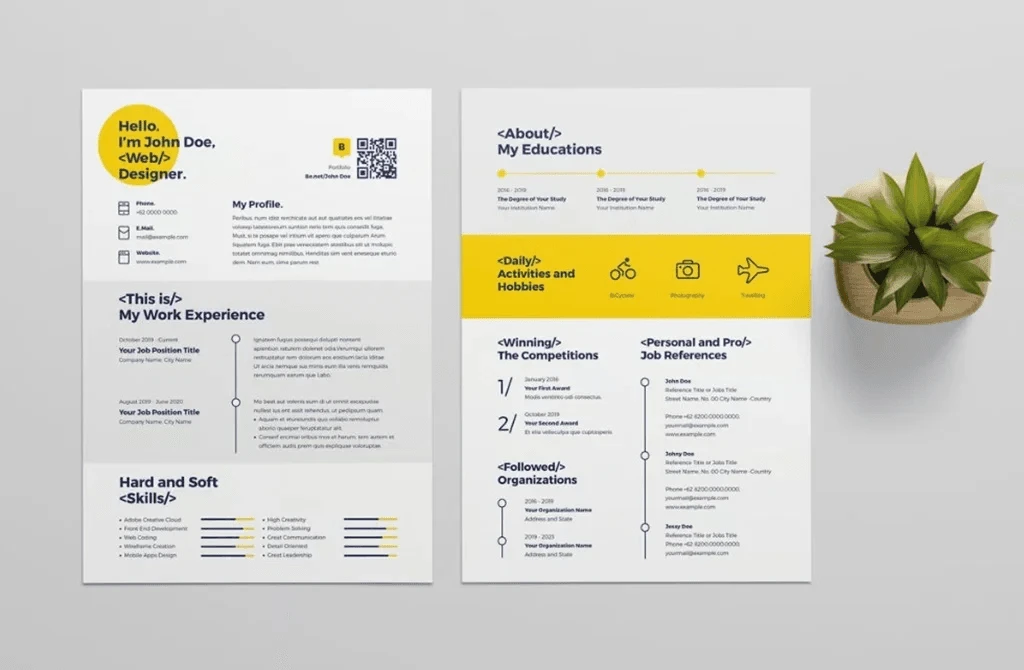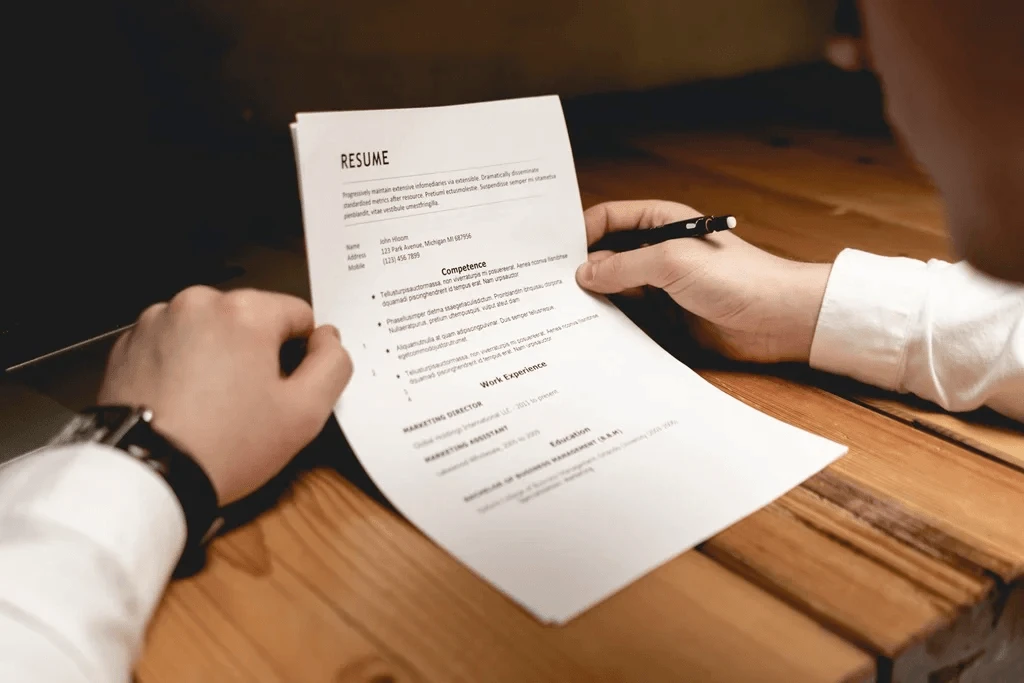Creating your first resume can be daunting. This guide provides a straightforward resume example for beginners. Learn how to highlight your skills and experiences to land your first job.
Key Takeaways
- A beginner’s resume should highlight skills, education, and relevant experiences, such as internships and volunteer work, to capture employer interest despite limited work history.
- Using a functional resume format can effectively emphasize skills over experience, making it ideal for entry-level applicants to showcase their abilities.
- Crafting a strong resume objective and professional summary, tailored to the job description, can significantly increase your chances of securing interviews.
Top Resume Example for Beginners: Land Your First Job Effortlessly
Landing your first job can feel like an uphill battle, especially when you’re just starting out and don’t have much professional experience to show. But fear not! A beginner’s resume aims to demonstrate your ability to excel at standard duties, even with limited experience. Employers often look beyond just work history; they value skills like problem-solving and teamwork, which can be showcased through various experiences.
Templates can save time and effectively display your qualifications. A functional resume template, for instance, is fantastic because it allows you to arrange your skills into categories, making your qualifications the star of the show. This flexibility is particularly beneficial for entry-level resumes with limited work experience.
Before you start, consider your strengths and how they align with the job requirements. This will help you confidently showcase your abilities and match your unique skills and experiences with what employers are looking for. Crafting a strong resume is vital as it serves as your first impression to potential employers.
Introduction
Beginning your career journey can be both exciting and daunting. For beginners, a well-crafted resume effectively presents their skills and qualifications to potential employers. This guide is designed to provide step-by-step advice tailored specifically for entry-level applicants, significantly boosting your chances of landing your first job.
This guide will teach you how to highlight your education, showcase relevant volunteer and internship experience, and create a standout skills section. You’ll also discover tips for writing a professional summary, formatting your resume, and even crafting a strong cover letter.
Following these steps will help you create a resume that impresses and lands you that coveted entry level job as a retail sales associate position.
Beginner’s Resume Template

A beginner’s resume should focus on highlighting skills, education, and relevant achievements from diverse experiences like internships and volunteer work. A resume template streamlines the creation process and ensures proper formatting. Templates provide a framework that helps you organize information logically and make sure nothing important is left out.
One popular format for entry-level resumes is the functional resume, which emphasizes skills over work experience. This format allows you to showcase your relevant skills front and center, which is perfect for those new to the job market. Ensure your professional resume contact details are up to date and include your phone number, email, and LinkedIn profile. Additionally, reviewing entry level resume examples can provide valuable insights.
Starting bullet points with strong action verbs can effectively highlight your skills and contributions. Match your skills and experiences with the job requirements to increase your chances of getting an interview. Employers often prioritize skills like problem-solving and teamwork over GPAs when evaluating candidates with no experience.
Take the time to confidently showcase your strengths related to job requirements.
Crafting a Strong Resume Objective
A resume objective is a brief statement that outlines your career goals and reasons for applying. For entry-level candidates, it’s a vital part of the beginner’s resume as it helps communicate your intentions and highlight relevant skills. A strong resume objective can significantly increase your chances of securing job interviews for entry-level positions.
Emphasize how your personal skills can add value to the employer in your resume objective. Specific details about the company in your objective can demonstrate alignment with the employer’s needs. A strong entry-level resume objective should include a mix of hard skills, soft skills, and clear career goals.
The challenge is to fit a lot into two to three sentences, but including attention-getting tidbits can be a pro tip for writing an effective objective. Stating your career goals and intentions for the role shows your passion and relevance to the job. A well-crafted resume objective can distinguish you from other entry-level applicants and grab the hiring manager’s attention.
Highlighting Education and Academic Achievements
The education section is pivotal, especially if you lack extensive work experience. List your education in reverse chronological order. Make sure to include essential details such as the degree name, major, university name, location, and years attended.
For undergraduates or recent graduates, providing more details in the education section can be beneficial. Highlighting honors, awards, and relevant coursework can strengthen your resume and demonstrate your commitment to learning. If your GPA is below 3.5, leave it off your resume.
Academic achievements and extracurricular activities can add depth and showcase a well-rounded profile, including career highlights.
Showcasing Relevant Volunteer and Internship Experience
Volunteer work significantly differentiates you from other candidates, especially early in your career. Unpaid volunteer experiences often serve as valuable indicators of your character and work ethic to employers. Relevant volunteer roles can demonstrate your commitment to a particular industry or career path.
Include volunteer work in the employment history section but clarify that the roles were unpaid. Specifics about your volunteer roles, like leading teams or achieving fundraising goals, can enhance their impact on your resume. Participation in sports teams or freelance projects can illustrate teamwork, dedication, and initiative, adding value to your resume.
Details about your internship experiences are equally important. These roles often provide hands-on experience that is directly relevant experience to the job you’re seeking. Highlight skills and knowledge gained during internships to show your practical capabilities and readiness for the professional world.

Creating a Skills Section That Stands Out
A well-crafted skills section showcases both your technical and interpersonal abilities, which potential employers often seek. To make the beginner’s resume even more appealing, include a mix of hard skills and soft skills to enhance the attractiveness of your resume. Tailoring the skills section to the job description can significantly improve your resume’s effectiveness.
List 5 to 10 of your most relevant skills to keep the section clear and impactful. Presenting skills in a structured format, like bullet points or categories, can make them stand out.
Demonstrating soft skills like teamwork and communication is essential in an entry-level resume. Highlighting a few well-known skills rather than many lesser-known ones enhances the clarity and impact of your resume.
Including Certifications and Licenses
Certifications and licenses are standardized professional credentials that can significantly enhance your employability. Certifications relevant to the job you’re applying for showcase your suitability and credentials to hiring managers. Place the certifications section below your work experience but above your education.
List the name, issuing organization, date earned, and location if relevant for certifications. Label ongoing certifications as ‘In Progress’ or ‘Expected’ to show they are forthcoming. This section can either be included within the education section or in a dedicated section to highlight specialized skills.
Adding Personal Projects and Extracurricular Activities
Personal projects and extracurricular activities provide insight into your character and skills, illustrating passions beyond professional experience. They can substitute for work experience, showcasing transferable skills to potential employers. Include types of projects ranging from class assignments to personal curiosity projects.
Personal projects and extracurricular activities demonstrate your initiative and add depth to your profile. For instance, a notable project like developing a customer management system that improved efficiency by 30% and enhanced customer satisfaction can significantly enhance your resume.
Activities like writing articles, making videos, or participating in sports teams can illustrate your diverse skills and dedication.

Writing a Professional Summary
In modern job searches, a professional summary is often preferred over a resume objective due to its focus on qualifications. A professional summary typically consists of 2-5 sentences highlighting your relevant skills and accomplishments, positioned near the top of your resume. Measurable achievements in your summary can impress hiring managers by demonstrating your impact in previous roles. A certified professional resume writer can help you craft an effective summary.
Strong action verbs in your resume summary can enhance the impact of your statements and showcase your value effectively. Tailoring your resume summary with specific keywords from the job description can improve compatibility with applicant tracking systems.
Make it the final step to craft a beginner’s resume profile, after reviewing all your career information for clarity and relevance.
Formatting Tips for a Polished Resume
Correct resume formatting is crucial for making a positive impression. A functional resume format emphasizes skills over work experience, suitable for those new to the job market. Key elements for an entry-level resume include big headings, simple fonts, and plenty of white space.
Keep your margins no less than half an inch on all sides. Use bold, italics, and underlining to enhance readability, and avoid small fonts. Consistency in punctuation throughout the document is crucial.
Save your resume as a PDF to preserve formatting when sending to potential employers. Action verbs in bullet points can make them look polished and professional.
Proofreading and Finalizing Your Resume
Thorough proofreading is vital as even a single mistake can adversely affect your chances of employment. Tools like spellcheck and Grammarly can help identify errors, but they are not always completely reliable. Reading your resume out loud can identify awkward phrasing and improve overall flow.
Taking a break before proofreading allows you to return with a fresh perspective, making it easier to spot mistakes. Printing your resume can help you notice errors that may be overlooked on a screen. Someone else reviewing your resume can provide valuable feedback and catch errors you might have missed.
Crafting a Strong Cover Letter
A strong cover letter is often overlooked yet is vital in the job application process. A well-written cover letter can significantly increase your chances of getting an interview. Key elements of a strong cover letter include the hiring manager’s name, demonstrating an understanding of the company’s needs, and suggesting how you can help.
End your professional cover letter with a call to action, encouraging the hiring manager to contact you for an interview. Drafting a general cover letter that can be tailored for similar jobs saves time while ensuring each application feels personalized.
If you don’t get a call right away, follow up. Persistence can make the difference.

Saving and Submitting Your Beginner’s Resume
Save your resume in the correct format to ensure it is ATS-compatible and preserves its formatting. Save your resume as a .doc, .docx, or PDF file to ensure ATS compatibility, avoiding non-standard formats. PDF format is recommended as it preserves the layout and prevents alterations, ensuring consistent presentation.
Keep the resume file name concise and readable by recruiters, such as Your Name-Job Title-CV-Company Name-Date. This practice enhances ATS compatibility and ensures your resume retains its formatting across systems.
These steps will help your resume stand out and ensure it reaches the hiring manager without issues.
Frequently Asked Questions
Should I include my GPA on my resume?
You should include your GPA on your resume only if it’s above 3.5; otherwise, it’s better to leave it off. Keeping it strong gives you a better chance to shine!
How important is a cover letter when applying for an entry-level position?
A cover letter is crucial for entry-level positions as it personalizes your application and showcases how you can meet the company’s needs, boosting your chances of landing an interview. Don’t skip it!
What format should I save my resume in for online applications?
Save your resume as a .doc, .docx, or PDF to keep it ATS-friendly and maintain your formatting. This way, you’ll have the best chance of catching the employer’s eye!
How can I make my skills section stand out on my resume?
To make your skills section pop, blend hard and soft skills while customizing it to match the job description. Organizing them into bullet points or clear categories also helps grab attention!
How can I effectively highlight my volunteer experience on my resume?
To effectively highlight your volunteer experience, include it alongside your employment history, clearly marking it as unpaid. Be sure to detail your roles and achievements, like leading teams or meeting fundraising goals, to really make an impact.

Propel Your Career Forward with a Standout Beginner’s Resume
Crafting a strong beginner’s resume requires focusing on your unique skills, education, and relevant experiences. Using templates and the functional resume format can help you effectively showcase your qualifications. A compelling resume objective or professional summary, along with a well-organized skills section, can make a significant difference in how your resume is perceived.
Remember to highlight your education, volunteer work, internships, certifications, and personal projects to create a well-rounded profile. Pay attention to formatting, proofreading, and including a strong cover letter to enhance your application. By following these guidelines, you’ll be well on your way to landing your first job effortlessly.
Ready to take your resume to the next level? Visit Resume Professional Writers for expert resume writing services that can help you stand out from the crowd and achieve your career goals. Let us assist you in crafting a resume that captures the attention of hiring managers and sets you on the path to success!








